#and will give false info on gifts related to LI
Text
Tristán is what still being friends in your 20s with that girl you had the toxic codependent homoerotic reationship with in your youth is like
#i was writing a whole text in drafts about his idealized views of others and getting all confused#basically i kind of imagine both him and his vision of LI as C-ta and his mind version of A-ya#in his mind LI is helpless without him and will forever need him. he WANTS him to depend on him#so LI coming out of his shell after Micah's arrival (since he doesnt know about the time loops) feel threatining#he blames Micah and hates the guy for being the first to call him out on his bs#Mel made him get used to to having his actions and words defended. justified in ways that would benefit him#but Mel also likes Micah. and her not immediately siding with him anymore feels as a betrayal#as a sign that his life with no consequences where he gets what he wants is close to its end#hes happy with how his life is like. so these changes (even if healthier for his friends) are seen as terrible in his eyes#hes willing to let Micah do whatever he wants as long as he stays far away from his childhood friend and sister#which is why hes the NPC in charge of gifts and unlocking new areas. hes desperate to get Micah to focus on Jeong and Camila#of going somewhere else#and will give false info on gifts related to LI#because of him feeling like he should always gets what he wants is the reason he has 'preferences' concerning LI#he feels like he should dictate how his friend should not only act but look like#and any LI that deviates from certain characteristics (like Lila and Leslie) gets a more passive aggresive treatment from him#tristán (oc)#when i said 'gives fake info about LI' i mean hes willing to suggest Micah buys stuff that will make LI ill#in his bad end he dsnt care either that Micah is there too because that one is willing to reinforce the ways Tris expects LI and Mel to act#in a post good ending they would send his ass to therapy
2 notes
·
View notes
Text
"You want to know what death is? I'll tell you. Death is the loss of life. Despite everything doctors like me attempt... a patient's life can still fall through our fingers. You think death lies in the apex of science? Anyone with such little regard for life will die by my hand."
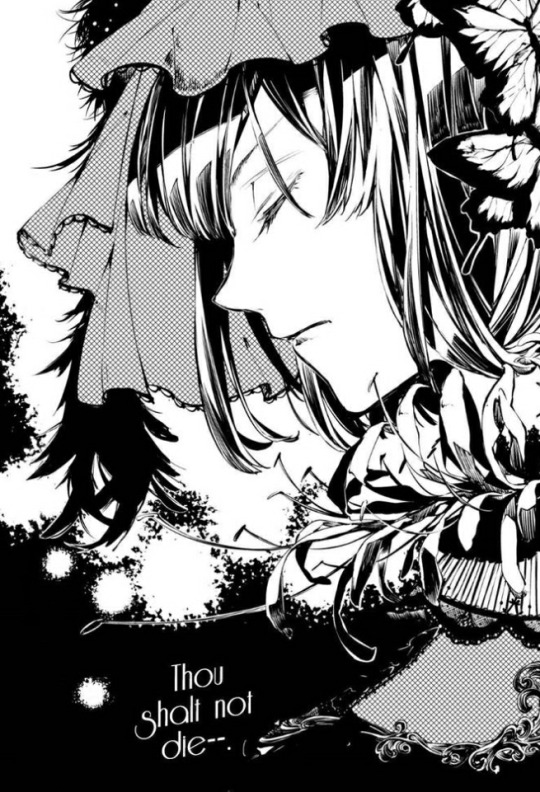
Character Analysis: Yosano Akiko
Age: 25 || Ability: Thou Shalt Not Die
BSD CHAPTER CHAPTER 65-66 SPOILERS
table of contents:
1. Author counterpart.
2. Yosano's history.
3. 'Angel of Death' defined.
4. Yosano and Atsushi.
YOSANO BRAINROT!*(#&!*@#($
1. Author counterpart.
Having been given the “Sho Ho” at birth, Yosano Akiko’s counterpart—the real-life author—was known for her zealous take on both feminism and pacifism.
Side note: Once again, to avoid confusion, I will use the name Sho Ho in reference to the real-life author, and Yosano in reference to the BSD character.
Sho Ho's writings were pretty much out-of-the-ordinary in her time, and despite being suppressed by the social norms of gender hierarchy, she sought to reform society’s view on the cultural perspectives of women and their sexuality (She expressed her love for a woman in one of her poems, but many still argued on whether she identified herself as queer or not.)
"Thou Shalt Not Die," Yosano's ability, is actually named after one of Sho Ho's most famous, controversial poems. She wrote it for her brother, who was a soldier in the war between Russia and Japan (1904-1905). In her poem, she expressed her general distaste for war and how her brother was a part of it.
O my young brother, I cry for you
Don't you understand you must not die!
You who were born the last of all
Command a special store of parents' love
Would parents place a blade in children's hands
Teaching them to murder other men
Teaching them to kill and then to die?
Have you so learned and grown to twenty-four?
- excerpt from Sho Ho's poem, "Kimi Shinitamou Koto Nakare"
Her words were blunt enough to inflict guilt on her brother's conscience, as she wasn't afraid to express her disapproval over how her brother took part in the typical violent bloodshed and manslaughter of war. Such opinions perturbed the authorities, and her work was eventually banned from the public for a period of time. Later on, it was used as an anti-war statement.
2. Yosano's history.
Now, as for the character in BSD, Yosano is seen to be generally strong-willed, and later on, we see that she is terrifyingly compassionately ambitious in the way she treats her patients. She treasured life itself, and hated the thought of losing a patient.
Yosano had developed her relations with Mori Ougai back in the Great War, when she was just 11 years old. Her ability was a great benefactor in saving lives. Realistically speaking, she was used for her ability to heal injured soldiers and diminish the effect of any casualty acquired.
Initially, she wasn't aware of this, until one of her close friends pointed it out by subtly accusing Mori of manipulating her to participate in the War under the close-to false pretence of 'saving lives.'
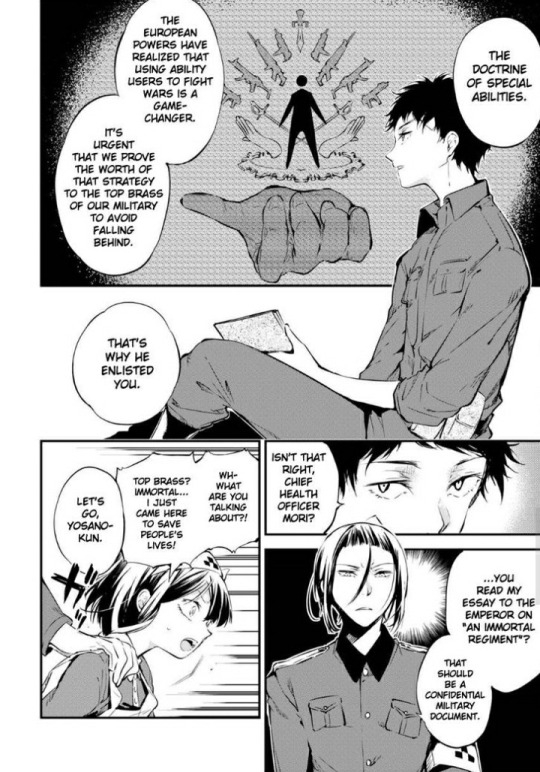
As much as her ability did save lives, it also forced soldiers to return to the frontlines and suffer injuries over and over again. The soldiers were never given the opportunity to return to their families because of her ability. This obliged them to carry on in the war without any excuse, inserting them into a vicious cycle they had no escape out of.
Metaphorically speaking, Yosano's hatred for Mori sort of mirrors Sho Ho's disdain for war and fighting, don't you think? The way Kafka materialised Yosano's past was quite interesting because he used chapters 65 and 66 to explain Yosano's dislike for Mori, reflecting how Sho Ho used her poem to explain why she condemned the idea of war and how her brother was part of it.
Before the effect of her ability was fully understood, however, every soldier praised and thanked her for what an angel she was. One of the soldiers she had befriended and gotten close to even kept a tally of the number of times she had saved him. He was the one who gifted her the butterfly hairpin she wore all the time.
The weight of the truth that her ability was a curse rather than a blessing fully dawned on her when her soldier friend ultimately committed suicide, because the fact of being indefinitely trapped in the throes of war agonised him until his spirit gave out. This drove Yosano to loathe her ability, or rather, how it was used.
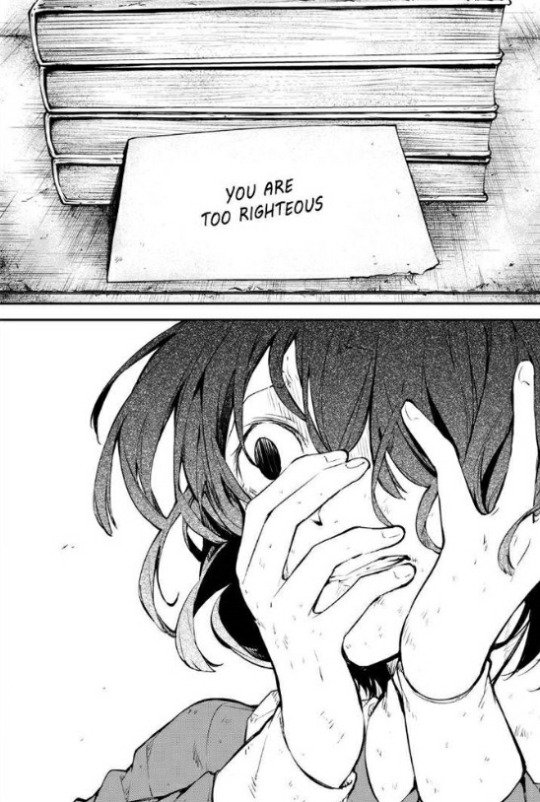
In the time she participated in the War, Yosano was given the alias 'angel of death' due to the control she retained over the battlefield, but I thought that perhaps Kafka had a reason behind giving her this title, so I did my research.
3. 'Angel of Death' defined.
Side note: I wouldn't want to disrespect any culture or religion, so if my citations are inaccurate and/or disrespectful, do feel free to correct me/let me know! I did research out of pure curiosity, and I don't intend to twist the significance of any of the interpretations.
I had to grow up learning about the basics of religious stuff, so it's kind of nice to study something out of the box, and very much against my father's rigid belief system :D
ARCHANGEL ARIEL
(archangel: an angel of higher rank)
I came across the few characteristics of angels/goddesses and their roles, and the one which really caught my attention was the female archangel, Ariel, the angel of nature.

[ source ]
In Hebrew, the name Ariel means 'altar' or 'lioness of God,' and her role is to heal. In addition to that, she is also recognised as a helper to another one of the seven main archangels, Raphael, whose role is to provide physical and emotional healing, too.
She is the protecter of the environment and the animals therein, and is bestowed with the duty to oversee the order of heavenly bodies as well as earth's natural resources. She assures the sustenance of food, water, shelter, and supplies of human beings, much like how a nurse is to a patient I suppose.
In relation to Yosano, I think this part is pretty self-explanatory, or perhaps this is blown out of proportion HA, so take this as a suggestion rather than a fact, because I'd like to believe that Kafka had a reason for giving Yosano a title as such.
In the past, I've come across the angel of death only to perceive it as a female grim reaper of some sort, so it was pretty cool to find that the word 'angel' and 'death' made up a title of a someone like Ariel, one of the purest forms of humility and compassion.
GREEK GODDESS PANAKEIA
For my beloved (wannabe/or not) students of Greek mythology (much like myself, let's make a cult!), you've probably heard of Panakeia, the goddess of healing. Medicine finds most of its vital significance in Greek history, and in its mythology, Panakeia is actually known for her ability to heal any kind of sickness.
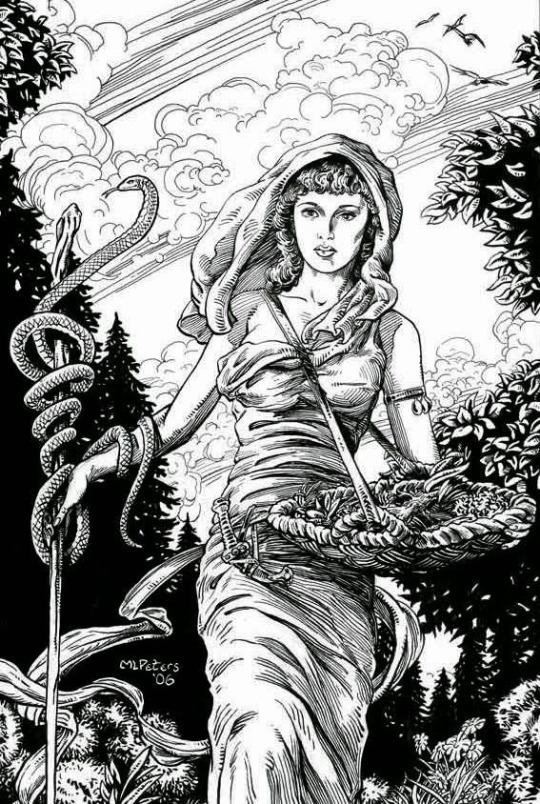
[ source ]
Her name means 'panacea,' which is actually defined as a remedy for all diseases. Terminal diseases and injuries lead to death, right? This would bring us back to Yosano's ability to nullify any injury's effects on a person, keeping them from death itself.
Now, we know that in order for Yosano's ability to work, her patient, or victim, has to be in a near-death condition in order for her treatment to take effect. This can't exactly fit into the description of resurrection, but it can be described as some sort of rebirth.
GREEK GODDESS PERSEPHONE
So another goddess which reminds me of Sho Ho/Yosano, is Persephone, the goddess of spring and rebirth. Before Hades, the god of the underworld, fell in love with Persephone to take her to live with him, Persephone lived a happy life.
Hades, with his nature of darkness and the like, was captivated by how pure Persephone was, and stole her away from her former life to live in an environment which differed sharply from her natural aura of purity.
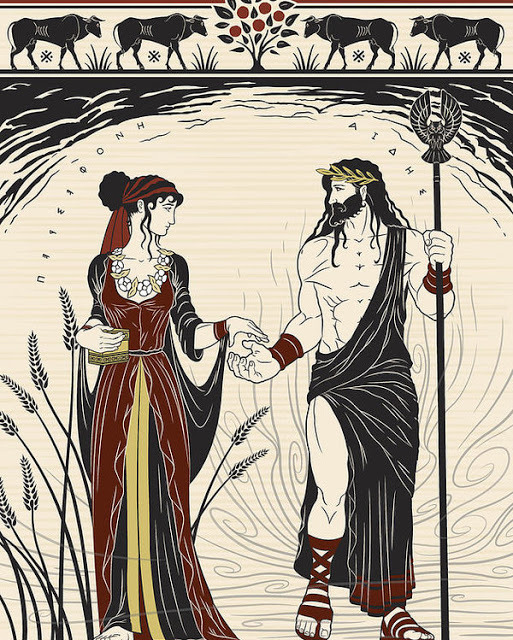
[ source ]
Remember when Yosano's friend left a note behind before he killed himself? The note said nothing except for, "You are too righteous." Take that as you will, but figuratively speaking, you could say Mori takes the role of Hades in the story, while Yosano can be portrayed as Persephone.
Sho Ho can also be a parallel of Persephone, in that she had to adapt to the realities of war and disharmony, while Persephone had to adapt to the raw darkness of the underworld with Hades.
Sho Ho stood against society's norms and decided to reform it, making her one of the most well-known feministic pacifist in history, while Persephone managed to escape from the underworld to return to her former position, earning the title the 'Bringer of Life,' or the 'Destroyer of Death.'
Furthermore, the way Sho Ho's anti-war poem took its effect later on, reflects the way Persephone restored balance in the world after returning from the underworld.
4. Yosano and Atsushi.
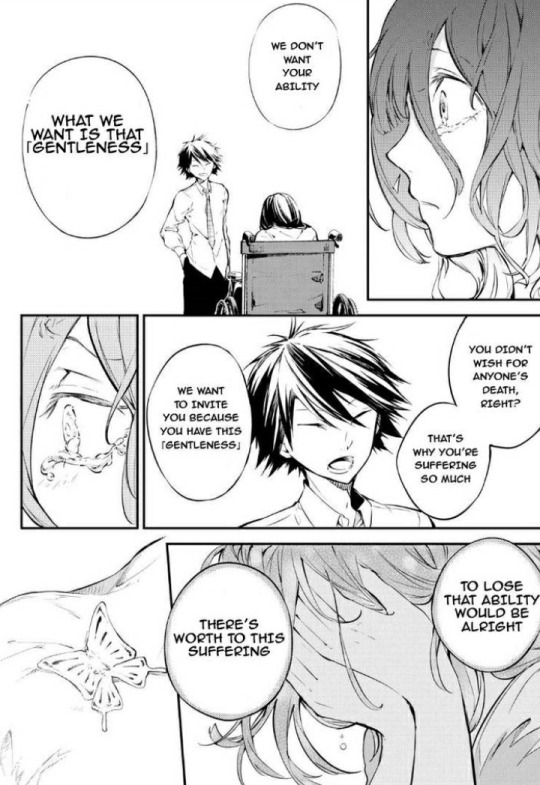
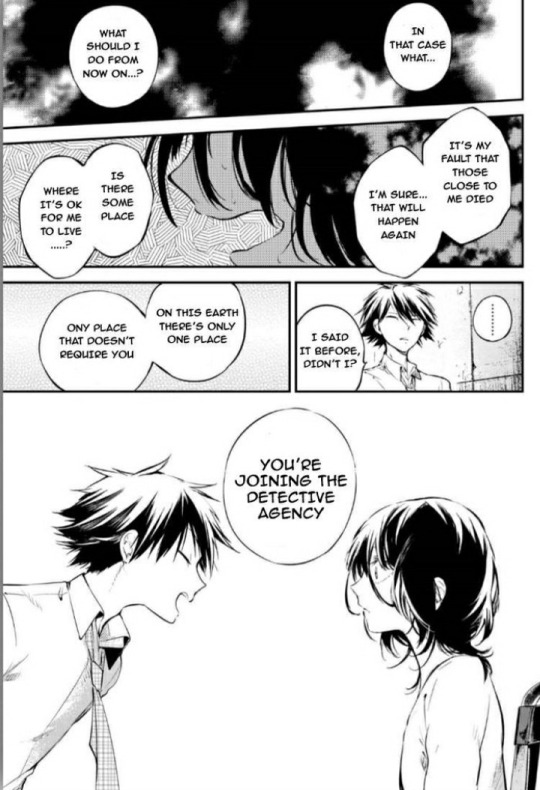
chapter 66; Yosano: "It's my fault that those close to me died... Is there some place where it's okay for me to live?"
chapter 8; Atsushi: "If I have any chance of saving them all, of returning them home safely, would that mean it's okay for me to keep on living?"
I couldn't help but think of Dazai and Atsushi back when I was reading through these panels. Ranpo (my beloved), along with Fukuzawa, accepted Yosano as she was, despite how her ability was a cause of despair and misfortune.
Ranpo looked past her mistakes and the entirety of how dark her past was to welcome her into the Armed Detective Agency. Dazai, on the other hand, knew who Atsushi was and what his ability had made him do before anyone else, and still decided to provide a safe place for Atsushi to find his sense of belonging, journeying with him as he learned to use his ability properly.
For more info about Dazai and Atsushi's dynamic, you can check out the analysis I did for Dazai :D
Atsushi desired to save people to prove his right to live, while Yosano made her wish to achieve the recovery of all her patients the reason for her existence.
Others would prefer to accuse both Yosano and Atsushi of having a saviour complex, but the reason why they pursued to save people with utmost dedication, stems from the nature of what their past was like. You know the saying 'from broken to beautiful?' Yeah, it's something like that.
The way their pasts were written out gave them a desire to change, which was, I daresay, initiated by the people who took them in: Ranpo and Dazai. Their abilities were demonised because of how they were used, but once they broke from their abilities' effect over their lives, they honed their skills to control them for the right cause instead.
In a less cynical point of view, I believe both Yosano and Atsushi stood for what was right, and wanted nothing but to achieve peace and harmony in whatever way they could, even if it meant risking their own lives to save others.
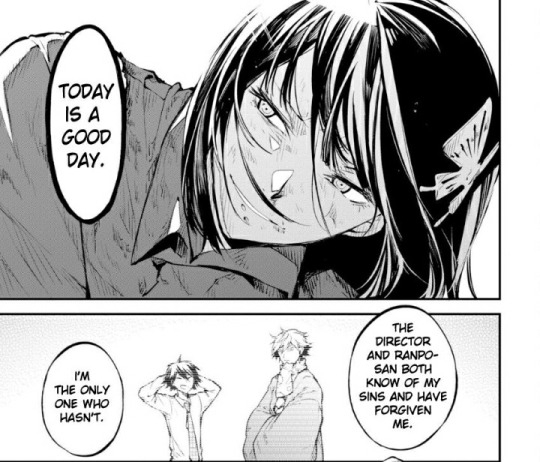
So yeah, that's it for my rants today. Thank you for reading, and if you have anything to add, go ahead! I'm open to discussions ;)
#bsd#bsd atsushi#bsd yosano#bungou stray dogs#bungo stray dogs#bsd characters#bsd analysis#literature analysis#bsd abilities#bsd anime#bsd manga#bungo stray dogs atsushi#bungou stray dogs atsushi#bungou stray dogs yosano#bsd dazai#bsd mori#bsd ranpo#character analysis#.daydreams
177 notes
·
View notes
Text
Ὀδύσσεια + τό ἑκᾰτόν
OR The Odyssey + The 100, an in-depth look at parallels to Homeric canon in season 6, and how the themes and motifs present on Sanctum mirror Odysseus’s 10-year journey back to Ithaca.
DISCLAIMER: I was a Russian Lit major, not a Classics major, so I’m not an expert on this. I did study Ancient Greek and Ancient Greek Drama for 6 and 2 semesters in college, respectively, though, but my expertise is more on The Iliad than The Odyssey so just...cut me some slack lol
If you’re not down for this 2.7k word mini-dissertation, here’s your chance to turn back.
So for those of you who don’t know me, I’m a major Classics nerd. I studied The Iliad in the original in college (and yes, I will be writing a series of metas about how s1-5 are The Iliad so keep an eye out for that), but The Odyssey remains, arguably, Homer’s most prolific epic. I’ve never parsed the text in the original, so I’m not going to be doing any sort of text-to-quote analysis because I think using a translation would be a disservice to the text (major Classics nerd. cannot stress this enough.), but I’m gonna be doing a rundown of all the major stops on Odysseus’s journey and how The 100 has mimicked each and every one of those stops in season 6 thus far.
Still reading? Cool, let’s do this thing.
Some of you may have already read my theory on the anomaly and how I think what lies inside is something like the Island of the Lotus Eaters. If you haven’t read it, you can check it out here, but brief summary: the Lotus Eaters is the first stop Odysseus and his crew make. The Lotus plant is so entrancing that it makes people forget all about their lives outside the island and coerces them to stay there, stuck in a sort of opiate-like blissed out haze of chillness for the rest of their lives, and I think that may be what’s happening in the anomaly, not time travel like others have theorized. Cool, moving on.
The next stop of Odysseus’s journey is the island of Polyphemus, the cyclops who intends to eat him and his men.

(Giulio Romano, Polyphemus)
They manage to escape when Odysseus (using the fake name of “Nobody”) blinds Polyphemus and they hide under the bellies of his sheep in order to avoid detection as they escape his cave.
Let’s think, how does this relate to our heroes? What’s happening right now on the show, going into episode 6x12?

(gif credit: @commander-anya)
Clarke is pretending to be Josephine in order to blindside the Primes and help her people escape.
In The Odyssey, this is a continuation of the theme of “hosting” or “guest-friendship” (a term I’m borrowing from wikipedia since I’ve been out of school for over a year and don’t feel like actually thinking for this pseudo literary analysis). We saw this with the Lotus-Eaters, and we see it again with Polyphemus. But the Cyclops is a bad host. So are the Primes.
Polyphemus’s host gift to Odysseus is that he tells him he’ll eat him last. He won’t spare him, but he’ll give him longer to live than the rest of his men. One of the drawbacks, is that means Odysseus is going to watch all of his people die, one by one, until he meets his demise.
God, how many times have Clarke and Bellamy watched their people suffer? And now the Primes have a way to make nightblood. They’ve turned Echo into a nightblood. Who’s next? Presumably all of them, one by one, until all the Primes are brought back to life. And with Clarke masquerading as Josephine, how many of her people is she going to watch be tortured? How many might she lose in tonight’s episode and in next week’s episode before they manage to beat the Primes and escape? How much have they lost? How much more must they lose?
We also get our first hint of the theme of “cunning over strength” (a term I’m borrowing from SparkNotes because, again, I really don’t feel like putting more effort into this than I already am lmfao) at this point in The Odyssey. Odysseus devises a plan to escape the Cyclops that involves very little violence compared to the blood-soaked battles that we saw in The Iliad. Rather than brute force, he uses his cunning to escape.
Clarke is going in as Josephine. She's not going for brute force. She’s not barging in with an army (that part comes later). This move is pure Clarke, all head. Going with the most cunning plan, not the most direct, not the most violent, the most strategic.
Clarke Griffin is Odysseus.
GODDAMN IM LOVING THIS. I digress.
The next major plot point in The Odyssey is Odysseus running into Aeolus, the god of the winds.

(source unknown by me, but this image is public domain)
He gives Odysseus a bag containing the four cardinal winds which, when opened at the right time, will send him straight home to Ithaca. His men think that the bag secretly contains a treasure that Odysseus is hoarding for himself and they open the bag, releasing the winds, and sending their ship even further off course than before, prolonging their journey.
I stumbled over this one for a second because it could be a few different moments in season 6. Gabriel giving Clarke info on how to take down the Primes? No, where’s the sabotage there? Murphy attempting to help Josephine to get mind drives for him and Emori? No, he ends up doing the right thing and puts them on the right track. Spacekru & friends devising a plan to defeat the Primes and Madi attacking them, sending them off the proverbial course? Hmm, sounds about right.
To make this easier for me, let’s call Bellamy, Echo, Emori, Murphy, Jordan, Miller, and Madi Spacekru 2.0. Well, they’re trying to make their plan to “work with” the Primes so they can get a compound, a home, for them and their people. But Madi is the crew to Spacekru 2.0′s Odysseus. She has her own agenda. She wants the treasure, she wants her revenge.
She attacks the Primes, releases the winds as it were, and all hell breaks loose.

(gif credit: @bellamyblakepositivity)
They’re thrown off course. How will they ever get their compound now? How will they get their home?
[Fun etymology fact break: Homecoming is stylized in The Odyssey as “νόστος” (nostos), when an epic hero returns home via voyage by sea, aka the MAIN theme in this epic. We get the word “nostalgia” from nostos, mixed with άλγος (algos) which means pain. Nostalgia is the pain of yearning for the past or for home. Is nostalgia/homecoming not one of the key themes of The 100? Is it not one of the key themes of The Odyssey? (also you could probably write an analysis of how nostos is a hero returning by sea and the way that space and the sea are often visually/metaphorically compared, the way you navigate both domains in a ship, the way you have an odyssey and a space odyssey....but that’s a discussion for another time)]
Next up on the journey? Aeaea, Circe’s island.
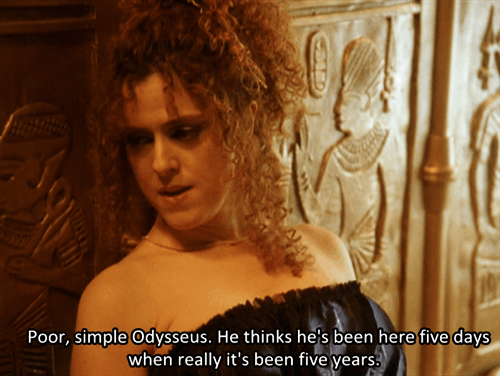
(gif credit: ? if anyone knows, hmu so i can give credit please!)
Circe was a witch who turned men into animals (mainly pigs in The Odyssey, but in another myth, into a woodpecker, which isn’t relevant, I just think it’s funny). Here we get the motif of transformation and false appearances, a continuation of the Nobody plot, and a motif that we also see with the Primes taking over other people’s bodies, constantly transforming their appearances.
While climbing a mountain to reach Circe’s palace, Hermes points Odysseus to a plant which will make him immune to Circe’s transformation magic. Why does this sound familiar......
The neural mesh in Clarke’s head gives her resistance to the mind drive allowing her consciousness to survive the “transformation.”
Like the Island of the Lotus Eaters (and the anomaly) Circe has the ability to manipulate the passage of time, or rather, the perception of the passage of time. Odysseus loses quite a significant amount of time trapped on her island. (It’s not actually 5 years, the mini-series fudged that bit a little since Homer never specifies how long it is, but I’ll forgive you, The Odyssey mini-series, because I love you so very much that I cried when I found you on DVD in a tiny Wal-Mart in the backwoods of Tallahassee two years ago)
We also get another look at the complicated theme of guest-friendship on Circe’s island. She is, quite simply, a terrible host. She traps Odysseus’s men, just like the Primes trap Spacekru 2.0. Odysseus frees them. It’s on Clarke to free her people from the terrible hosts that are the Primes. There’s a joke in there about the Primes bodies being hosts to the mind-drives. Anyway.
Odysseus’s next stop is the land of the dead. He descends into Hades (a very perilous feat) to talk with the blind prophet Tiresias. He also talks to Anticlea, his deceased mother.
My god, if that stop isn’t exactly 6x07 Nevermind.
Clarke talks to Jake Griffin, and tells him she thinks she’s dead, she’s ready to give up, she’s ready to let go. Odysseus tells Anticlea he feels the gods are against him, his journey is fruitless, he’ll never make it home. I don’t think that parallel could be more obvious if it punched you in the face.
I think maybe Monty is Tiresias in this scenario, giving Clarke advice and helping her navigate the mindspace so she can send a message to Bellamy that she’s alive which will give her the advantage of having an ally on her side. Odysseus promises Tiresias he’ll make a sacrifice to him once he gets back into the world of the living bc the dead feast on blood or something like that, but that’s like Clarke promising Monty she’ll do her best to continue to honor his challenge to her to do better. So cool. Love it.

(gif credit: @janemichaels)
Thematically, this mimics the theme of “testing” that’s present in The Odyssey (thank wikipedia again for helping me on this one lmao). You get Odysseus’s men’s loyalty being tested, and you get Odysseus’s identity itself being tested.
Clarke is tested when she is faced with the option of giving up and letting go. Spacekru 2.0 (and particularly Murphy and Emori) are tested when they learn Clarke is gone, then learn she’s alive. Will they be loyal enough to her to save her? Hint: yes, obviously, because Spacekru 2.0 is way better than Odysseus’s crew. Will Clarke decide to push forward and fight for her life? Hint: yeah, duh, because she’s just as badass as Odysseus.
Next comes the sirens.
Odysseus’s ship sails through the isle of the sirens, whose song lures sailors to their deaths. Odysseus makes his men stuff their ears with beeswax so they won’t be tempted by the song, but he ties himself to the mast, wanting to hear it. I kinda struggled with this one, but then I realized, at this point, we’re not looking at Clarke as Odysseus.
We’re looking at Octavia as Odysseus.
Octavia is faced with her greatest fear. She ends up running into the anomaly after Diyoza. If I’m right about the anomaly being sort of the Lotus Eaters, then we could assume that the anomaly holds Octavia’s deepest desires; that might have been what she’d have seen if she’d chosen the green box. She hears the call, and resists. The temptation and the overcoming thereof.
I think that’s clear enough, so I’m gonna skip ahead to the passage between Scylla and Charybdis.
Earlier, Circe had warned Odysseus of this choice he would have to make. Choose the 6-headed monster on the left and lose at best, 6 of his men. Choose the whirlpool on the right, and lose them all.
[Sidenote: how interesting is it that the anomaly is associated with a spiral shape, mimicking that of a whirlpool? Should we believe that if they enter the anomaly it is, in fact, certain death that awaits them? Or is it a metaphoric whirlpool, and they’re just being sucked in, never to return to their original mission of returning home (*cough* Lotus Eaters again *cough*)?]

(gif credit: @aryastarktheshewolf)
So I think this choice is reminiscent of Octavia’s choices of the red box versus the green box. Presumably, face her greatest fears or her deepest desires. She chooses the red box. Better to face her fears and risk dying that way than face her desires (the same green of the anomaly anyone??) and risk getting sucked in like Diyoza was, never to return.
She never saw her deepest desires in the forest (from what we saw) so it makes sense that she would choose the red box. She knows she can escape her fears. Blodreina no more. But if she faces her desires, who’s to say she could ever turn back?

(gif credit: @daeneryskairipa)
Cool cool, so freaking cool, I love these parallels so much, y’all.
Now we get to explore the most Prime-like example of “guest-friendship” in The Odyssey.
Ogygia. Calypso’s island.
[Fun etymology fact break: “Kαλύπτω” (kalupto), the word that lends its root to Calypso’s name, means “to conceal” or “to deceive.” Calypso is “the one who conceals,” she’s “the deceiver.” “Ὠγύγιος” (ogugios), which lends its meaning to Ogygia, means “primeval” or “primal.” The Primes...the first settlers of Sanctum...the ones from the earliest ages (another interpretation of the word). The Primes, the deceivers. The Primes, the primeval ones. Hmmm.]

(screencap from The Odyssey mini-series, 1997. btw, Vanessa Williams will ALWAYS be Calypso in my mind)
Calypso offers Odysseus a home on Ogygia, but he will have to abandon his dream of returning to Ithaca, to his home, to his wife, Penelope, and to his son, Telemachus. She actually prevents him from leaving for seven years (more warped passage of time a la the anomaly), effectively keeping him prisoner. But he wants for nothing there. He is fed and clothed and bathed and sheltered.
Our heroes are offered a home on Sanctum, but it’s not all it appears. It’s not the paradise they’re lead to believe it to be. They’re deceived.
[EDIT: Leah @braveprincess offered an interesting take on Calypso, which I absolutely HAVE to share with y’all:

Anyway, let my rant continue]
In order to stay, they must sacrifice Clarke, Madi too, and well, now, all of their people the Primes want to make into nightbloods. They’re prisoners in Sanctum. They can’t leave, not only because the Primes won’t let them, but because what awaits them is the Children of Gabriel and the mysteries of this new planet. Their best chance at survival is with the Primes. But that also means compromising and losing people they refuse to be without.
Bellamy is Odysseus now. Clarke is his Penelope.

(gif credit: @bellarkedaily)
He won’t negotiate with the Primes. He won’t sacrifice Clarke. Shut up, I’m not crying, you’re crying.
Athena asks Zeus to intervene, so he sends Hermes to tell Calypso she must release Odysseus. Odysseus leaves to continue the next, and last, part of his journey. His return home.
Bellamy leaves Sanctum to save Clarke. Once he has her back, they can continue their final journey, building a home on this new world. Or so we hope.
But who knows? We haven’t seen the finale yet. Maybe they’ll stay on this world. Maybe not.
Some people have been theorizing that they’ll return to Earth (via time travel or whatever it is, which I don’t really buy but whatever), which would be a really nice conclusion to the theme of nostos, but the problem with that is right now, there is no Earth to return to. Nostos only works if there’s a home to go back to. And that home, usually, must be unchanged from when the hero left to fit into the proper meaning of the word.
So, what would be the best way for The 100 to get our heroes back to Earth to fulfill this Odyssey-esque narrative that they (probably unwittingly) have set up?
SEND ‘EM INTO THE ANOMALY!
Let them chill there, enjoy a little bit of paradise, let time pass super fast in the outside world while it passes normally for them, let Earth recover, and send ‘em back. But that bit is more of a pipe dream than anything else and I doubt that’s what they’ll do. I’m not a big fan of most anomaly theories, but I think that could be a cool one. Who knows.
Anyway, that’s all I have for today. Next week post-finale, I’ll probably work through the rest of The Odyssey, with Odysseus’s return to Ithaca, defeating the suitors, and winning his wife back, if all goes to plan with beating the Primes. So if you liked this (admittedly rambling half-cocked mini thesis paper), keep an eye out for that one.
After this season, I’m gonna be doing a series on how seasons 1-5 are actually The Iliad, so if you wanna scream about Classics & The 100 with me, just drop a line in my ask :)
#the 100 meta#meta#the 100#the100meta#the 100 spoilers#the 100 is homer and you cant convince me otherwise#my transliterated greek is ancient greek pronunciation not modern greek#so dont @ me about that lmao ik upsilons are different in modern#i hope u enjoyed and uhhhh come yell with me about classics
70 notes
·
View notes
Text
1, 2, 3 (play the game again)
“Don’t think about it so much.”
The information had come in, with the driver of the new arrival calling in ahead of time. It gives Yerin enough time to get ready for work. The holding area isn’t a very beautiful place, but it’s like a playground for Yerin, who swings from locked up, caged in detentions as if they were monkey bars. The play that she performs brings the biggest thrill, as if she’s kicked herself high up on the playground swings, and the tiny flip her stomach makes is disgusting. It makes Yerin nervously excited like a child anyways. Every part of it is disgusting. Her companions are mumbling to themselves in the hallway as Yerin passes through, keeping to herself and out of the way; there’s no need to be stopped and talked to, especially when there’s work to do. The Queen likes productivity, and Yerin will become the most efficient unit in this damn place if she needs to be.
The people around here try their best to look intimidating, and it’s so cute that Yerin could almost laugh about it, but instead she settles herself calmly as she walks. The hallways look the same, one after another: lacking labels and directions, illuminated with harsh LEDs. She keeps her face forward, blank as the walls. The brutes around will laugh about things that aren’t work related, but Yerin is a lady after all, and she can spend her time gossiping outside of work hours. Besides, this task of hers isn’t as intensive or involved as the other tasks are. The others, they can do all the hard work. Yerin will just get the information and be done with it, like usual. If she’s in the right mood, then maybe she’ll have a little bit of fun. The day’s end is always the same; Yerin never gets tired of her work. The praise she expects to receive is enough to bring excited and bubbly feeling right from the bottom of her stomach and allows it to make a home in Yerin’s throat.
From what Yerin remembers on her assignment file, the new addition to the facility, prisoner, a captured intellectual (or supposedly so) sticks out like a sore thumb. Yerin chews on the skin beside her nail, reading the words over again. Feisty. Apparently, this person had put up quite the fight, but the witch is supposed to be stronger than how she looks. There’s some splotchy handwriting on the corner of the page. Something about the color pink? Yerin shrugs.
When Yerin types her login into the machine, it gives her a sound beep and grants entry, to her sorting database. Just within this past month, there’s been many successful transactions. People are dying to have a good witch or two for their own uses, and as long as they’re benefitting the Queen in somewhat, it mustn’t be so bad. Yerin types without considering the weight of her actions. After checking which cell she’s due to be collecting information under for their new Guest, Yerin picks up her bag from the ground and heads to the bathroom.
The torn tights go on, as well as her particularly scuffed shoes. The shirt with imitation stains and slightly pulled fabric goes on. Her hair, which had been so nice today (there are simply just sacrifices one can’t avoid) becomes a mess. She drags the heels of her palms down her eyes, smudging the cheap, one dollar eyeliner that she had wore today. On info days like this, it was sometimes easier to gather sympathy if you looked like a piece of shit. Red lipstick, perfectly applied from earlier this morning, gets smudged away from the corners, as if she’d been hurt in a scuffle. Yerin always does best in pretending to be the character who was gently roughed up, and then gave in without too much of a fight. It’s her job to sort the witches through how useful they are, and pretending to have also been stolen, is a great way to earn their trust. This new person has an interesting report already, but Yerin figures that they can falsely connect with each other, with Yerin under disguise and pouring lies from her mouth, and it’ll save her the flying fists. Another bullet point on the report: something about a bite? Whatever.
Her work is dangerous. Sitting in a cage with a lion is never a good idea.
Yerin nods her head to some of the guards who stand outside the holding center. It’s a confined space, nothing less than a jail cell, but it eases some of the workers’ minds to be called something else. It’s from here that Yerin helps to decide the fate of the little witches who have accidentally found their way into the Queen’s system. (Not accidentally. They’ve been observed and captured, all like the plans say.)
She makes herself look small, entering one of the special cells in this facility, one that has reinforced bars, but Yerin knows better than to get close enough to touch them. She still has a nasty burn scar on her calf from the iron. The guards shut it behind her, and she scoots herself into the corner of the tiny room, knowing well that her coworkers are just out of eyesight, in case anything happens. If Yerin dies, she wouldn’t mind. Life just works that way. The best part about this job is being able to conduct a series of tests on her Guests, and seeing what kind of abilities they have is part of that. After tying a charmed rope around her ankles over and over again, Yerin brings her knees up to her chest and ducks her face down. She can already hear the loud noises from coming down the hall, the shoving and the screeching, the commanding.
The game starts again.
When the cell door opens, the bars creak against each other and Yerin pretends to flinch, gripping onto her knees a little tighter in a good image of a scared girl. Her face is hidden, but she peeks through her hair, turning her head to watch the site.
Oh, she’s incredible. She’s been terribly roughed up, but everything about her is beautiful. She must be talented, Yerin thinks to herself as she looks at their new Guest up and down. To have ended up in a place like this. Beauty, skill. Valuable.
Disgusting.
There’s green that dots Yerin’s throat and it casts a filter over her eyes; in her mind, she already wishes to finish this day. She takes in one shuddering breath- that’s not fake- and sighs. What an incredible Guest. Yerin will have fun this time.
She’s still fighting, struggling to not let herself be shoved into the cell, but the others have already gotten her mostly in, and as they slam the iron bars shut, the fabric of the lady’s pink skirt gets caught in the metal. Yerin wants to giggle at the scream of frustration the other gives, and the harsh tug she makes as well. The fabric stretches but doesn’t tear. Yeri goes back to pretending she’s scared.
After the other has somewhat calmed down, reduced to angry huffs and panting breaths, as she examines the room, Yerin makes it a show to flinch and meekly whimper whenever the other comes at least a step close. She sure hopes that her Guest will speak soon; her legs are just about to cramp because of this position. Yerin bites down hard on her lip to give herself an even more pitiful look, and maybe Miss Pretty Pink will come around to talk.
“Hey.”
Jackpot.
“Did you see what they used to lock this?”
Yerin shakes her head. The lady sighs deeply and sits, probably thinking hard and long to herself. Yerin takes notes. The analytical types are always rather tricky. They have to be trained like very good dogs, to just follow orders around here. Stolen witches shouldn’t be using their minds for anything except the Queen’s wishes. “Don’t know.”
Shuffling on the floor, Yeri pulls her head away from her knees, still gripping onto the fabric of her outfit, as if it’s the only thing that she has. “Excuse me,” Yerin says, voice small, fragile like it should be. “I’m- I’m- I can’t,” she fake stammers, moving her legs to show the ties that are done around it. “They just, they tie… back…”
Yerin hears the lady mumble something to herself, and was that a curse or did Yerin hear incorrectly? She watches, peeking out through under her bangs, as her Guest attempts to undo the charmed ropes. They do, in fact, untie and retie, as if they’re bound to Yerin’s legs forever. This had been a gift from the higher ups to help in these- interviews.
Though hearing some small mumbles about the rope, it comes off in fifteen minutes. Yerin blinks in genuine surprise. Oh this one is definitely useful, she thinks, watching as the other dusts her hands off. They begin to talk.
Yerin mostly listens, and finds out that as much as the other is rather chatty, she must also be rather powerful if she gave the workers a hard time. She looks terrible, like she’s put up a big fight, but her voice is soft and lovely. Yerin knows that only fools don’t call this beauty. The dimples on her cheeks are endearing, and Yerin almost hates having to sort this one away. Almost.
She’s charming. Incredibly charming. (The notes were very right about the whole pink thing.)
In time, Yerin watches and learns more about her. From time to time, they get up and look around the room together, looking for a way out that Yerin knows doesn’t exist. Yerin lets the other rattle the gate around and yell, but the only thing they get is looks from the people outside. Once they’re tired, the two of them sit down and talk again, tucked into the corner of the dark cell. Yerin hasn’t said her name once, not yet, just has whimpered and listened, has nodded her head and cried fake tears. Her Guest is enjoyable. Yerin hates it.
She tests her memory, probes into her abilities, inquires about her past. Asks about if she has any friends, family, who will be waiting for her once she’s set free.
That must hit a nerve. Her Guest’s polite smile fades away. Yerin watches her hands play with the frills on her dress. “We’ll get out of this mess.”
The optimism is cute, Yerin can give her that. If there’s one thing she’s learned since being in this cell with Pinky Witch, it’s that for every negative comment Yerin makes, the other is able to create two positive comments out of it.
Yerin pulls the best frown that she can, biting the inside of her cheek in feign nervousness and fright. The pulse that Yerin can feel beating strongly in her neck isn’t from fear, but rather the exhilaration from the absolute mess that she’s made. It’s rotten, god it’s so awful, but the Queen will be proud, and someone will know, oh they’ll start to know Yerin’s name. Her eyes sparkle - disgusting amusement. “Are you positive?”
There. She watches as the other’s brows furrow together. The door opens and the guards come for Yerin, pulling her away even as she fakely claws to stay, and the girl who’s confused on the floor only stands in time for the bar to be slammed shut.
Oh, Yerin’s having so much fun. They moment they set her down, Yerin pats their shoulders and runs off to find a computer. So much information to put in about this one.
The next day, Yerin is “thrown” into the cell when the other is sleeping, and she begins to fake sob over the pink skirt. Yerin babbles on about things that she’s seen- without giving away any information of course, because good servants are desensitized to their master’s doings. If this girl is going to be in any way affiliated with the Queen, Yerin has to make sure she’s broken.
Break her.
She continues to plant her doubts into the other’s mind. When Pinky mentions that they’ve got what it takes to escape, Yerin will take one of her mental needles and begin to thread through the other’s mind. She continues, pretending to cry. The other is sweet, too kind, as Yerin fake cries on her lap, there are fingers in her hair. This time, the other doesn’t say that they’ll be able to make it out.
The same thing goes. She learns about the abilities that her Guest, Miss Muffet, has to offer in their now destroyed plans of escape. Yerin continues to make her doubt, to break her. All she needs is to break her.
On day seven, Yerin has all the information she needs to give it to the higher ups. They’ll decide where this witch ends up, based on Yerin’s notes. She’s given her opinion as well, on what place would be suitable for the fiery, cute girl.
She strolls up to the cage, this time dressed regularly. The girl is just waking up again. She’s confused, asking questions, rattling them off to Yerin as if she were going down a list. It would’ve hurt Yerin to not say any goodbye, and even as the girl hollers and scream, the pure anger and rage which she hasn’t witnessed since day one, makes this game all worth it. For good measure, she helps drive her mental needles again through the core of the Guest’s mind.
“I’ll get out of here, one way or another!”
Yerin crosses her arms. An eyebrow goes up as she listens to the threat, and a sick smile fills the void in her expression. “Positive?”
4 notes
·
View notes
Text
“Poetry is at its basic level language at play. I try not to dictate the rules of that play.” gary lundy
gary’s style is an engaging cross between the spontaneity of artistic improvisation and a steady flow of interior monologue. His often fragmented word-play, draws us inescapably into his haunted world. His is singular voice that pulls us up by the heartstrings as he scrutinizes his life, his loves, and the ragged edges of longing. He is exquisitely open in his explorations of grief and vulnerability, facing the discordant notes head on. I think what impressed me most about gary’s writing is a virtuosity completely and refreshingly unpretentious and honest. Recommended.
when voices detach themselves is the first of two chapbooks by gary lundy published by Is a Rose Press, which focuses on “poetry, experimental writing, hybrid, and more.” when voices detach themselves was published in 2013 and the second, heartbreak elopes into a kind of forgiving was published in 2016. These are among several of gary’s published collections. The others are detailed in his bio, which closes this post.
This slideshow requires JavaScript.
*****
when voices detach themselves, when I imagine
I am listenting to their speakers sudden impact of
invisibility, of having lost the way, even through
insistence attempts to sidestep a bouncing young
noise. can it be. that through thought i confirm
my being. yet does it too proceed the thought.
can it not outlast loss.
in another location two people unwinder their
bodies from the previous nights encounter, move
to opposites sides of the room.
INTERVIEW
JAMIE: I’m sure you’ve had many questions from your students, readers, and interviewers over the years. Is there any question about poetry in general and/or your poetry specifically that you wish someone would ask and what would be your answer to that question?
GARY: In my experience people don’t tend to ask questions about poetry. Certainly many want to tell me what poetry can and can’t be. From the admonition that this or that word is overused and should be avoided, to “we have a moral obligation to protect the world from bad poetry.” This last one came after I refused to talk about those poets who didn’t inspire or compel, etc. From a well known poet who we had gathered to meet and greet, if you will.
I love poetry, even those pieces or books that don’t generate for me interest. I love language and words equally. Poetry is at its basic level language at play. I try not to dictate the rules of that play.
JAMIE: Your style is certainly engaging and rather singular, improvisational and fragmented like the voices about which you write in when voices detach themselves. Did it arrive one day in a flash or is it something that evolved and is perhaps still evolving?
GARY: Thank you. For this particular book I returned to poems I’d written a few years earlier and then left behind. When I reintroduced myself to them i realized that in their fragmented way they fit together. So I listened and then the book was reallized.
My writing practice is pretty consistent in that I usually write every day. But I don’t begin with a sense of where the writing is going to go. That is, I have little interest in dictating where the words lead. Rather, I’ll jot something down, a fragment or phrase and then what’s on the page begins to dictate direction.
Naturally, when I first began to explore writing poetry I followed those dictates of teachers and peers. I worked to write the poem expected, the poem of rules. I also wrote specifically out of or from my life experiences. It was a good practice to be sure.
However, eventually I began to understand that such writing, for me of course, was more a group writing than writing as it came to me. My life did not seem to fit easily into the formulas I’d been encouraged to use. Perhaps because I hadn’t really begun to recognize my queer identity, but my world was not constructed within easy narrative or linear structure. Rather, it was filled with false starts, disconcerting interruptions, and a sense of loss and failure. I began to listen to that rather than any central sense of self. Naturally this is an ongoing and delightful adventure in discovering where the writing wants to go.
JAMIE: You write about the discordant notes in life, the fears, the jolts that come out of nowhere, the losses, and the distancing that seems to happen between lovers and friends, and the way expectations and outcomes don’t necessarily jive … all the aches and pains of life, the vulnerabilities. Is there healing for you in the writing, in the naming? Is your hope – expectation – that there might be some healing for the reader?
GARY: This is an intriguing question. When I write I have little expectation past the writing as it unfolds. Certainly, when I return to what has been written, especially after a few months or years, I suppose there is some kind of healing; although, I’d prefer insight. A few years ago I moved to Providence, Rhode Island, to be with a lover and friends. It was a good experience; however, it was also not so good. After I returned to Montana I reread my first full length collection, heartbreak elopes into a kind of forgiving. I was preparing to give a reading and hadn’t really thought very much about the poems. However, as i read through the pieces, all written before my move, there were warnings throughout. I could see that however it came, evidently I knew I shouldn’t make the move. The poems were written a couple years earlier. Curious to be sure. While I try to pay attention to such meanings in my poetry, unfortunately, for the most part I miss them consistently.
I have no expectation for my reader, nor of even having a reader. I am convinced that if there is a reader they will find their own sense of what’s going on in the poem as they listen to the poem. While writing certainly and clearly assumes a reader, I don’t. I write for the pleasure of writing, and, perhaps, to keep me in some way grounded.
JAMIE: I suspect you’ve been writing since high school and college and I know you have quite a body of published work. What’s up next?
GARY: Well, to get some few pieces published in magazines and journals; perhaps land another book or two. But foremost is simply to continue writing, and reading, to continue learning about those facets of my compound and complex sense of self and world.
POEMS
as i have to do i bring this to a more personal
level. certainly in my writing part of the task has
been to find a form that not only expresses what
i have lived. but the stories of what i can live. feel
certain that every marginalized person has this
task. or remains subordinate and enslaved. yet
as i struggle with the how of actualizing this. or
getting to the story not in unremarkable and
familiar narrative. i realize how troubling and
difficult it is.
i apologize for loading you down with images.
just excited to get closer to present. and maybe
a future.
****
as out of remarkable past
a slight look aside peripheral desire
another over written story lies
indeed it may only be overdue bills
envelopes stacked against the south wall
last years dishes long the growing mold
****
you came to me later after other women had
taught me their possibility and mine while men
kept warning their usual mantra it is a mans
world but it isn’t after all and a reality exists
outside even their peripheral gaze even outside
their understanding a desire full of exception and
expectation for a different kind of language a
different kind of life where ego shrinks to the size
of a pea and life become quite suddenly more
about more than usual
gary’s poetry is shared here with permission
© gary lundy
RELATED:
reading the signs can be terrifying, gary lundy, Cutbank, The Literary Journal of the University of Montana
gary lundy has published five chapbooks, the two most recent, and still in print, when voices detach themselves (Is A Rose Press, 2013), and at | with (Locofo Chaps, 2017), and has two book length collections, heartbreak elopes into a kind of forgiving (Is A Rose Press, 2016); and each room echoes absence (Foothills Publishing, 2018). He has published his writing throughout the US as well as in Canada, Czeck Republic, and Israel. Most recently his poems have appeared in Fence, Meta/Phor(e)/Play, Cutbank: Weekly Flash Prose & Prose Poetry, Setu: Western Voices Special Edition, and Alexandria Quarterly.
gary was raised in Denver, Colorado. He received his Ph.D. in Twentieth Century American Poetry from Binghamton University. He taught English at SUNY-Oswego, St. Paul’s College, and for twenty years at the University of Montana Western. gary, now retired, is queer and lives in Missoula, Montana.
ABOUT
Jamie Dedes. I’m a Lebanese-American freelance writer, poet, content editor, blogger and the mother of a world-class actor and mother-in-law of a stellar writer/photographer. No grandchildren, but my grandkitty, Dahlia, rocks big time. I am hopelessly in love with nature and all her creatures. In another lifetime, I was a columnist, a publicist, and an associate editor to a regional employment publication. I’ve had to reinvent myself to accommodate scarred lungs, pulmonary hypertension, right-sided heart failure, connective tissue disease, and a rare managed but incurable blood cancer. The gift in this is time for my primary love: literature. I study/read/write from a comfy bed where I’ve carved out a busy life writing feature articles, short stories, and poetry and managing The BeZine and its associated activities and The Poet by Day jamiededes.com, an info hub for writers meant to encourage good but lesser-known poets, women and minority poets, outsider artists, and artists just finding their voices in maturity. The Poet by Day is dedicated to supporting freedom of artistic expression and human rights. Email [email protected] for permissions, commissions, or assignments.
Testimonials / Disclosure / Facebook
Recent and Upcoming in Digital Publications * The Damask Garden, In a Woman’s Voice, August 11, 2019 / This short story is dedicated to all refugees. That would be one in every 113 people. * Five poems, Spirit of Nature, Opa Anthology of Poetry, 2019 * From the Small Beginning, Entropy Magazine (Enclave, #Final Poems), July 2019 * Over His Morning Coffee, Front Porch Review, July 2019 * Three poems, Our Poetry Archive, September 2019
“Every pair of eyes facing you has probably experienced something you could not endure.” Lucille Clifton
“when voices detach themselves,” by gary lundy; review, interview, poems "Poetry is at its basic level language at play. I try not to dictate the rules of that play." gary lundy…
0 notes